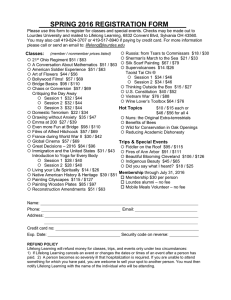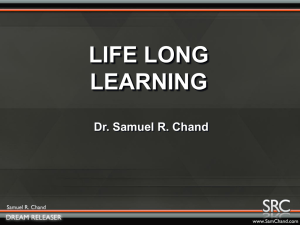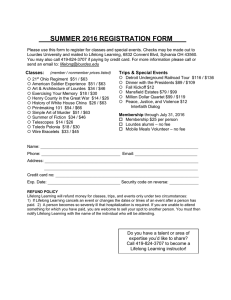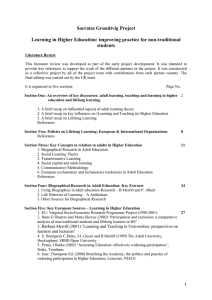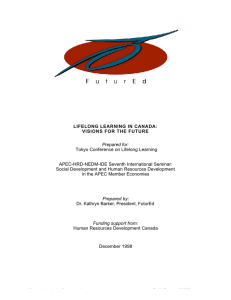Live, Learn, Lead Learning Constantly
advertisement
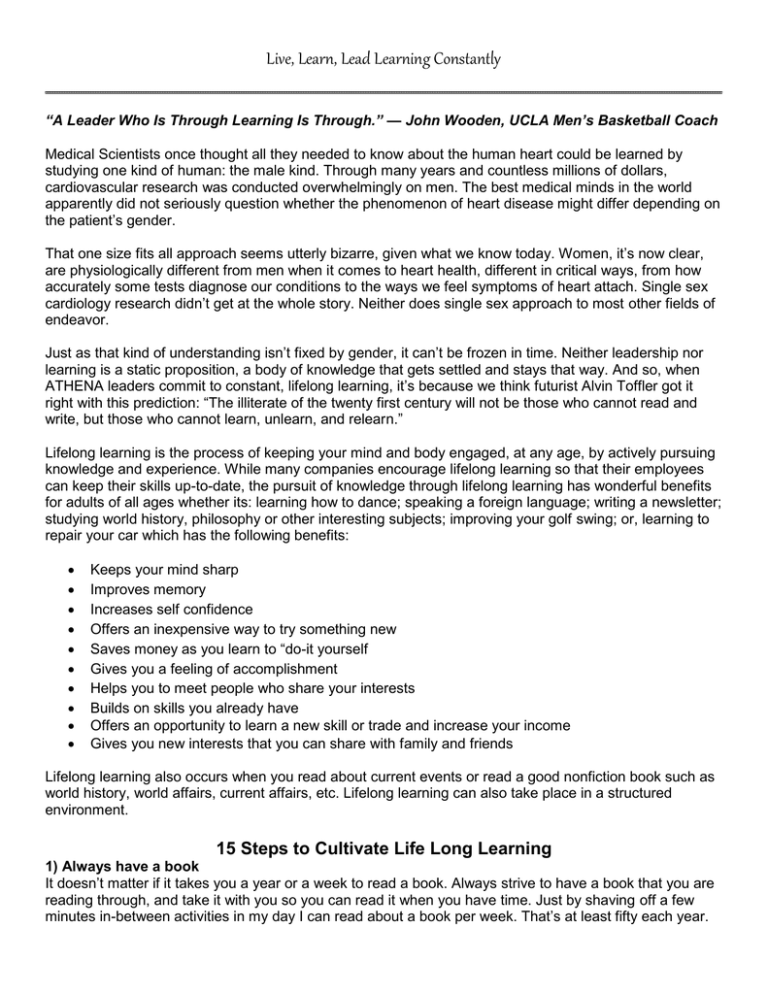
Live, Learn, Lead Learning Constantly ___________________________________________________________________________________________________________________________________________________________________________________________________________________________________________________________________________________________ “A Leader Who Is Through Learning Is Through.” — John Wooden, UCLA Men’s Basketball Coach Medical Scientists once thought all they needed to know about the human heart could be learned by studying one kind of human: the male kind. Through many years and countless millions of dollars, cardiovascular research was conducted overwhelmingly on men. The best medical minds in the world apparently did not seriously question whether the phenomenon of heart disease might differ depending on the patient’s gender. That one size fits all approach seems utterly bizarre, given what we know today. Women, it’s now clear, are physiologically different from men when it comes to heart health, different in critical ways, from how accurately some tests diagnose our conditions to the ways we feel symptoms of heart attach. Single sex cardiology research didn’t get at the whole story. Neither does single sex approach to most other fields of endeavor. Just as that kind of understanding isn’t fixed by gender, it can’t be frozen in time. Neither leadership nor learning is a static proposition, a body of knowledge that gets settled and stays that way. And so, when ATHENA leaders commit to constant, lifelong learning, it’s because we think futurist Alvin Toffler got it right with this prediction: “The illiterate of the twenty first century will not be those who cannot read and write, but those who cannot learn, unlearn, and relearn.” Lifelong learning is the process of keeping your mind and body engaged, at any age, by actively pursuing knowledge and experience. While many companies encourage lifelong learning so that their employees can keep their skills up-to-date, the pursuit of knowledge through lifelong learning has wonderful benefits for adults of all ages whether its: learning how to dance; speaking a foreign language; writing a newsletter; studying world history, philosophy or other interesting subjects; improving your golf swing; or, learning to repair your car which has the following benefits: Keeps your mind sharp Improves memory Increases self confidence Offers an inexpensive way to try something new Saves money as you learn to “do-it yourself Gives you a feeling of accomplishment Helps you to meet people who share your interests Builds on skills you already have Offers an opportunity to learn a new skill or trade and increase your income Gives you new interests that you can share with family and friends Lifelong learning also occurs when you read about current events or read a good nonfiction book such as world history, world affairs, current affairs, etc. Lifelong learning can also take place in a structured environment. 15 Steps to Cultivate Life Long Learning 1) Always have a book It doesn’t matter if it takes you a year or a week to read a book. Always strive to have a book that you are reading through, and take it with you so you can read it when you have time. Just by shaving off a few minutes in-between activities in my day I can read about a book per week. That’s at least fifty each year. 2) Keep a “To-Learn” List We all have to-do lists. These are the tasks we need to accomplish. Try to also have a “to-learn” list. On it you can write ideas for new areas of study. Maybe you would like to take up a new language, learn a skill or read the collective works of Shakespeare. Whatever motivates you, write it down. 3) Get More Intellectual Friends Start spending more time with people who think. Not just people who are smart but people who actually invest much of their time in learning new skills. Their habits will rub off on you. Even better, they will probably share some of their knowledge with you. 4) Guided Thinking Albert Einstein once said, “Any man who reads too much and uses his own brain too little falls into lazy habits of thinking.” Simply studying the wisdom of others isn’t enough; you have to think through ideas yourself. Spend time journaling, meditating or contemplating over ideas you have learned. 5) Put it Into Practice Skill based learning is useless if it isn’t applied. Reading a book on C++ isn’t the same thing as writing a program. Studying painting isn’t the same as picking up a brush. If your knowledge can be applied, put it into practice. 6) Teach Others You learn what you teach. If you have an outlet of communicating ideas with others, you are more likely to solidify that learning. Start a blog, mentor someone or even discuss ideas with friends. 7) Clean Your Input Some forms of learning are easy to digest, but often lack substance. I make a point of regularly cleaning out my feed reader for blogs I subscribe to. Great blogs can be a powerful source of new ideas. But every few months I realize I’m collecting posts from blogs that I am simply skimming. Every few months, purify your input to save time and focus on what counts. 8) Learn in Groups Lifelong learning doesn’t mean condemning yourself to a stack of dusty textbooks. Join organizations that teach skills. Workshops and group learning events can make educating yourself a fun, social experience. 9) Unlearn Assumptions You can’t add water to a full cup. I always try to maintain a distance away from any idea. Too many convictions simply mean too few paths for new ideas. Actively seek out information that contradicts your worldview. 10) Find Jobs that Encourage Learning Pick a career that encourages continual learning. If you are in a job that doesn’t have much intellectual freedom, consider switching to one that does. Don’t spend forty hours of your week in a job that doesn’t challenge you. 11) Start a Project Set out to do something you don’t know how. Forced learning in this way can be fun and challenging. If you don’t know anything about computers, try building one. If you consider yourself a horrible artist, try a painting. 12) Follow Your Intuition Lifelong learning is like wandering through the wilderness. You can’t be sure what to expect and there isn’t always an end goal in mind. Letting your intuition guide you can make self-education more enjoyable. Most of our lives have been broken down to completely logical decisions, that making choices on a whim has been stamped out. 13) The Morning Fifteen Use the first fifteen minutes of your morning as a period for education. If you find yourself too groggy, you might want to wait a short time. Just don’t put it off later in the day where urgent activities will push it out of the way. 14) Reap the Rewards Learn information you can use. Understanding the basics of programming allows me to handle projects that other people would require outside help. Meeting a situation that makes use of your educational efforts can be a source of pride. 15) Make it a Priority Few external forces are going to persuade you to learn. The desire has to come from within. Once you decide you want to make lifelong learning a habit, it is up to you to make it a priority in your life.

